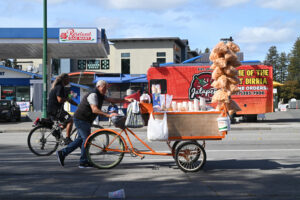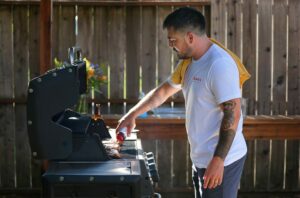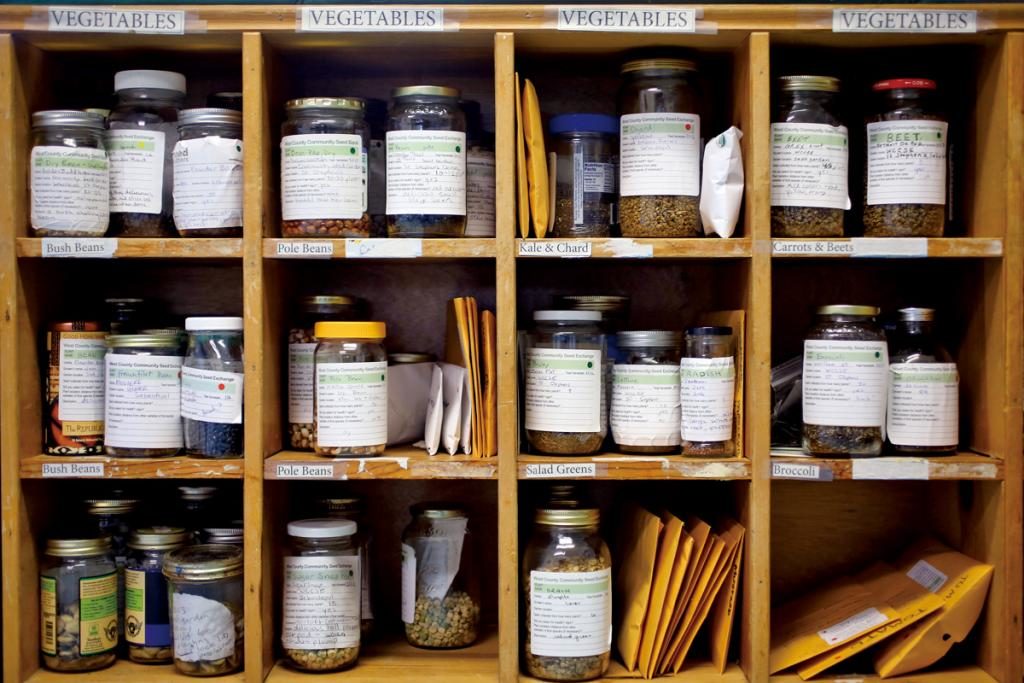“Seeds are about abundance,” says Sara McCamant, co-founder of the Sebastopol Seed Library, “and abundance leads to sharing.”
That’s just what the seed library does, sharing seeds that are donated by local gardeners and those that are grown at the library’s quarter-acre seed garden. The library is open to all, seeds are free, and seed donations are welcome and encouraged, yet not required. There are no late fees.
A seed library is not a seed bank, which preserves seed in a controlled environment so that it remains viable indefinitely, thus ensuring the survival of its genetic heritage. A library makes seeds available to individuals in order to encourage small-scale gardening and farming. This seed must be used and replenished for a seed library to thrive.
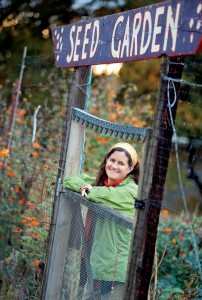
Operated under the umbrella of the West County Community Seed Exchange, the Sebastopol Seed Library and its garden are located at St. Stephen’s Episcopal Church, not far from downtown. Bookshelves in a meeting room hold more than 140 varieties of seeds, some in glass jars, others in envelopes.
On the last Saturday of each month from January through October, the library is open to the public. In November and December, volunteers conduct a major inventory, not just cataloging what the library contains, but also confirming that all seed is viable. A group of 10 core volunteers maintain the collection, oversee the garden and teach classes in seed saving.
The seed library was started six years ago by McCamant and other members of Transition Sebastopol, which is part of the international Transition Towns movement. Simply put, the movement seeks, at a local level, to establish long-term community resilience in anticipation of what is believed to be a future of fewer resources.
When members of the Sebastopol group asked themselves what it takes to build a strong, enduring local food system, seeds quickly emerged as the answer. Today, most commercial seed is controlled by international corporations; such seed comes from around the world and is not necessarily viable here. More importantly, seed from these sources puts corporations in control of local farming in a fundamental way.
“Why don’t we build a local seed source?” Transition Towns folk said to each other, and the idea of a library of seeds soon blossomed, as it has all over the United States and beyond. When the Sebastopol Seed Library was launched in 2008, there were fewer than 10 similar libraries in the country. Today there are more than 150, with new ones in the works, including locally.
Sometime this year, a new seed library will open at the Healdsburg Regional Library, with seeds stored in a vintage card catalog that library director Bo Simons found. The project was spearheaded by Carolyn Harrison of Sonoma Antique Apple Nursery fame and members of Transition Healdsburg, which Harrison helped form.
In November 2013, Transition Healdsburg hosted a community seed swap at Healdsburg Shed; seeds that remained after the exchange formed the beginning of the new collection, which will be accessible to the public whenever the public library itself is open.
Sebastopol Seed Library, St. Stephen’s Episcopal Church, 500 Robinson Road, Sebastopol, 707-829-5234, westcountyseedbank.blogspot.com
Healdsburg Seed Library, Healdsburg Regional Library, 139 Piper St., Healdsburg, 707-433-3772, sonomalibrary.org
Seed-saver Smarts
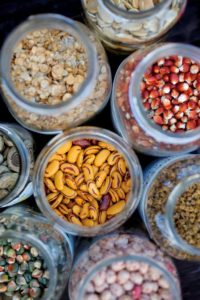
Growing for seed is not simply gardening. There is a learning curve: All seeds need careful handling, and some plants require special techniques if they are to produce viable seed.
To help guarantee a continuing source of new seeds, seed libraries distribute detailed instructions and sometimes offer classes, some that focus on the basics of saving seed and others that drill down to specific varieties of plants, especially those that require special skills.
Experts recommend beginning seed-savers start with self-pollinating varieties such as lettuces, tomatoes and other nightshades, peas and beans. Before moving on to broccoli, kale, cabbage and other brassicas and squashes (both summer and winter), it is necessary to learn hand-pollination so that you get true seed, not seed that has pollinated with unwanted varieties. Corn is particularly problematic, because it can easily cross with varieties that are as far as a mile away.
Classes at the West County Community Seed Exchange cover a single variety, such as heirloom beans, or a specific process, such as saving wet seeds (the method used with tomatoes). These classes typically are held when the seed library is open and include tastings and an opportunity to exchange seeds.
The Healdsburg Regional Library works with Master Gardeners, a program of the University of California Cooperative Extension, to offer a range of classes on certain Saturdays. Consult the library’s schedule for classes on saving seed.
The Seed Ambassador Project, based in Sweet Home, Ore., offers a free, detailed guide to seed saving; it’s available at seedambassadors.org/category/seed-saving-guide.








